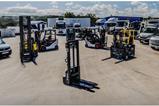European logistics giant Vlantana, based in the Klaipėda region of Lithuanian, has taken delivery of the first seven trucks in a 65-strong order for new gas-powered Volvo FH trucks. The remaining units are expected to be with the transport operator by September.
The new Volvo FH trucks, equipped with engines designed for liquefied natural gas (LNG) and biogas, are intended to reduce CO2 emissions and enhance the efficiency of Lithuania’s first liquefied and compressed gas refueling station, which will serve both Vlantana’s fleet and other carriers.
Sabina Chochrina, CEO of Vlantana, emphasised the company’s commitment to sustainability and the EU Green Deal objectives. “We aim to engage in pollution reduction measures by diversifying our vehicle fleet now. Our investments in an LNG station and increasing the number of gas-powered trucks are essential Climate Change mitigation measures. This will strengthen our market position, meet customer expectations, and maintain profitability,” she said.
The newly delivered Volvo FH trucks feature the Volvo G13C engine, offering 460 HP and 2,300 Nm torque, similar to diesel engines but with significantly lower CO2 emissions. When using liquefied biogas (bio-LNG), emissions can be reduced by up to 100%, and by 20% with natural gas compared to conventional diesel engines.
Nicholas Kjaer, Managing Director of Volvo Trucks Lithuania, highlighted the importance of moving towards cleaner transport solutions: “Gas-powered trucks are one of the best alternatives to diesel. We are pleased to introduce the first gas-powered Volvo trucks to Vlantana, contributing to sustainability and reducing carbon dioxide emissions in the road transport sector.”
In June, Vlantana also became the first company in Lithuania to install a liquefied and compressed natural gas refueling station. The station, with an 80,000-litre capacity and a refueling flow rate of 2.5 to 4.5 thousand kg/h, can refuel up to 20 trucks per hour and is compatible with vehicles from various manufacturers.


















